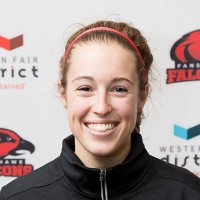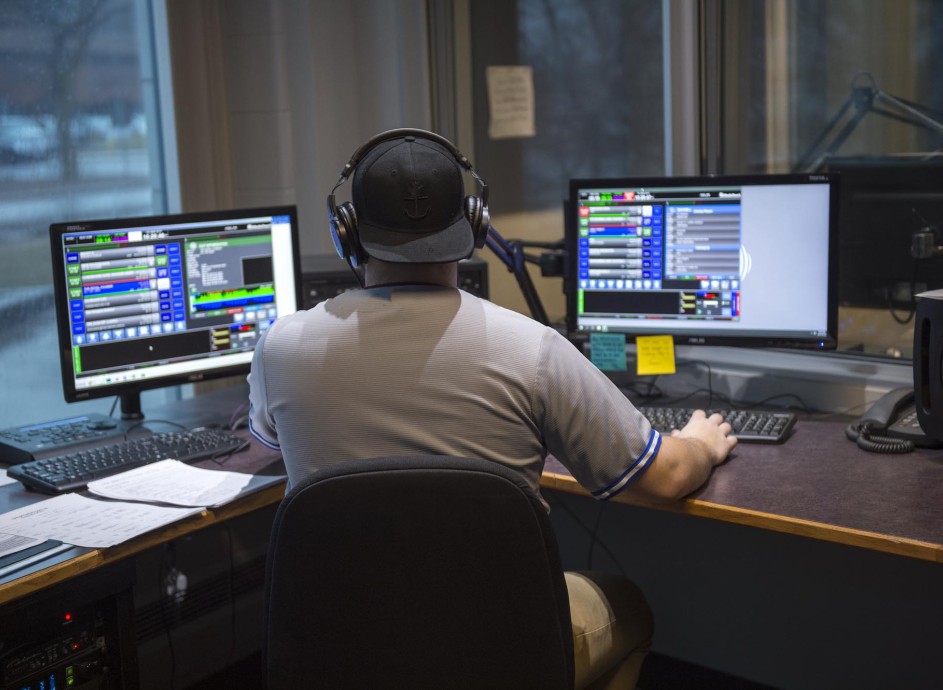
Program Overview
Program Details
Full Time Offerings
Full Time Offerings
Your Learning Experience
During this two-year diploma program, our radio courses will train you for a variety of careers not just in radio broadcasting, but also in emerging broadcast media. We are proud to have been awarded the 2019 President’s Distinguished Achievement Program award.
The Broadcasting - Radio and Media Production program is a highly concentrated hands-on approach to training students for careers in radio broadcasting and emerging broadcast media. Areas of study include On-Air Performance, Creative Writing, Audio and Commercial Production, Sales/Marketing/Promotions, Music and Programming and Web and Social Media content development. Students learn in a live on-air environment while performing on-air and various job functions identical to those in the broadcast industry.
Students operate three broadcast properties, which are equipped with the latest in broadcast technology. In collaboration with Journalism - Broadcast students, you'll program and operate three radio stations:
- The xFalcon
- CFRL Radio
- Stellar Radio
- CIXXFM 106.9 The X - Canada's first fully licensed teaching radio station equipped with the latest digital communications and production technology.
- View all Fanshawe radio stations and podcasts.
Students should be prepared to learn during additional hours in studios and to travel for field placements, as well students will be assigned to work on the Radio Fanshawe Inc. broadcast properties during holidays and weekends on a rotational basis.
For students interested in studying further, Western University and Fanshawe College have developed an articulation agreement, which gives you the opportunity to obtain an honours degree in Bachelor of Arts with a major in Media, Information and Technoculture (MIT), as well as a diploma in Broadcasting - Radio and Media Production. Students may start at Fanshawe, transferring into the third year of the MIT program, and complete both credentials in only four years.
Though our main focus is job-readiness in the radio industry, many of the skills learned are transferable to other industries.
Career Information
Graduates of Fanshawe’s Broadcasting – Radio and Media Production program enter private- and public broadcasting as on-air personalities, voice over artists, radio programmers, creative writers, producers, commercial sales and marketing representatives, and promotions personnel with opportunities across Canada and the world. Radio is the prime employer; however, TV, film, web and other media require personnel with the talents and skills possessed by Broadcasting - Radio graduates.
Did you know Fanshawe consistently ranks high in graduation employment rates among large colleges in Ontario?
Here are some examples of career opportunities for graduates of Fanshawe’s Broadcasting – Radio program:
Assistant Producer, Science Radio Show and Podcast
Join the team behind a “new and notable” space-themed podcast and radio show focusing on all aspects of astronomy and space exploration.
DJ/Emcee
Use your creativity and “on-air” skills to create spectacular events that entertain, push the boundaries and capture the imagination of your clients.
Summer Road Crew Member
Channel your fun and energetic personality to engage listeners, clients and the general public and interact on social media to promote the radio station.

Fanshawe has definitely changed my life. I've become a harder working, more organized student through my demanding course plus having to balance being a student athlete. I've learned a lot about myself - what's important to me, my values, what I'm passionate about and more. I've made career connections and great friendships.
Learning Outcomes
The graduate has reliably demonstrated the ability to
- Create radio productions and audio content, in studio and on location, using relevant broadcasting equipment and related industry technologies.
- Deliver, support and promote radio broadcast content via multiple platforms using a variety of media.
- Participate in the planning and preparation of programming content for a variety of radio formats.
- Monitor and evaluate the quality of radio broadcasts using appropriate relevant resources, tools and equipment which meet current industry standards.
- Assist in promoting the a station’s brand and generating revenues through a variety of marketing and advertising sales activities.
- Plan and prepare interviews, scripts and reporting content for use in radio broadcasts.
- Use business skills and accepted industry practices in the completion of tasks and projects.
- Keep current with the needs of the broadcast industry using strategies that enhance work performance and guide professional development.
- Perform all work in compliance with relevant statutes, regulations, legislation, industry standards and company policies.
- Present live programming on air to relay various types of information and stories in different formats.

Join Us for Open House
Find out if Fanshawe is the right fit for you at Open House. Explore Fanshawe's campuses, meet faculty and current students, and ask your questions about starting college.
Academic School
Broadcasting - Radio and Media Production Program Coordinator:
Abe Kelledjian
Admission Requirements
International Admission Equivalencies
English Language Requirements
English Language Requirements
| Test | Score |
|---|---|
| TOEFL iBT | 79 |
| IELTS Academic | Overall score of 6.0 with no score less than 5.5 in any of the four bands |
| CAEL | Overall score of 60 with no score less than 50 in any of the four bands. score of 80 in listening |
| PTE Academic | 53 |
| Cambridge English | Overall score of 169 with no language skill less than 162 |
| ESL4/GAP5 | Minimum grade of 80% in Level 8, 75% in Level 9, or 70% in Level 10 |
| Duolingo | Overall score of 105, with no score lower than 95 |
Recommended Academic Preparation
Recommended Academic Preparation
- Grade 12 Media Arts (M)
- Grade 12 Information and Communication Technology: Multimedia Solutions (C)
- Grade 11 or Grade 12 Communications Technology (M)
- Grade 12 Business and Technological Communication (O)
- Keyboarding Skills
Recommended Personal Preparation
Recommended Personal Preparation
- Persons considering application to the program should investigate radio broadcasting as a career by visiting a local radio station
- Knowledge of current events and social trends and skill in public speaking
- Time management
- Part-time employment at a radio station or any form of entertainment
- Be able to demonstrate above average written and spoken English language skills
- Maturity and a sense of responsibility
- Industry research to develop a clear understanding of industry work ethics, deadlines and competition
- Participation in performing arts (i.e., music or theatre)
Applicant Selection Criteria
Applicant Selection Criteria
Where the number of eligible applicants exceeds the available spaces in the program, the Applicant Selection Criteria will be:- Preference for Permanent Residents of Ontario
- Receipt of Application by February 1st (After this date, Fanshawe College will consider applicants on a first-come, first-served basis until the program is full)
- Achievement in the Admission Requirements
Post-Admission Requirements
Post-Admission Requirements
Mandatory Placement Assessment for WRIT CourseCourses
| Level 1 | ||||
| WRIT-1037 | Reason & Writing 1-Contemporary Media | 3 | ||
This course will introduce contemporary media students to essential principles of reading, writing, and reasoning at the postsecondary level. Students will identify, summarize, analyze, and evaluate multiple short readings and write persuasive response essays to develop their vocabulary, comprehension, grammar, and critical thinking. | ||||
| MKTG-1110 | Marketing & Media Foundations | 2 | ||
This course focuses on an introduction to integrated marketing communications and its reciprocal impact on the media industry. Students will learn how businesses market their products and services to a defined target consumer. Upon completion of the course, students will be able to identify marketing opportunities associated with a product or service and build a media plan to exploit those opportunities. | ||||
| RADO-1042 | Announcing & Show Preparation | 3 | ||
Students will learn the basics of on-air announcing techniques. This course will have added emphasis on adequate preparation to perform live on-air breaks, utilizing sources of information and other research tools required to create compelling, entertaining, and factual radio programming. | ||||
| RADO-1003 | Radio Broadcasting-Intro/History | 3 | ||
This course is designed to introduce the student to the radio broadcasting medium through an examination of the operation of a radio station, the Canadian radio broadcasting industry and its history. This course will also help students prepare for their first practical shifts on The Falcon and CFRL. | ||||
| RADO-1043 | Talk Radio 1 | 1 | ||
Students will learn the history of talk radio and how the format has evolved into one of the most popular forms of radio today. Students will learn the different types of radio shows, including podcasts, the importance of the talk show producer and the host's role in formulating strong content and opinion. | ||||
| RADO-1005 | Radio Production 1 | 3 | ||
Students will learn the basics of radio production. The development of elementary production techniques (audio editing and the basic mix) using a DAW (Digital Audio Workstation) will also be demonstrated. Students will learn how to perform as an announce operator on Fanshawe Colleges broadcast properties. | ||||
| RADO-1044 | Writing for Radio & Social Media 1 | 2 | ||
Through theoretical learning, students will learn what it means to be a copywriter and the importance of the position within the broadcast industry. Additionally, students will learn the similarities and vastly different approaches to writing for many social media platforms adopted by broadcasters. Supported by audio/visual examples and class discussions, students will discover how commercial and promotional messages should comply with the various provisions of the CRTC, Ad Standards Canada and the Canadian Broadcasting Standards Council. | ||||
| BRJR-1045 | Inclusive Journalism | 3 | ||
The course focuses on the role of journalists to cover racialized and marginalized communities in our diverse society. Students will be educated on the history and rights of Indigenous peoples in Canada. Unconscious bias is discussed, and how to have inclusive, diverse and equitable representation and perspectives in a range of stories. | ||||
Tuition Summary
London
*Total program costs are approximate, subject to change and do not include the health and dental plan fee, bus pass fee or program general expenses.






